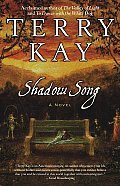
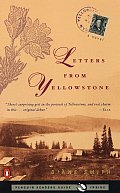


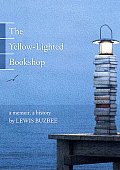
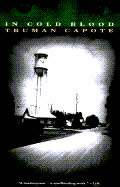

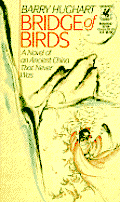 ...well, with one exception. I have no idea what books to take along with me on my upcoming trip. Hmmm, five days of vacation involving two flights each way. Now, I know I won't be able to finish more than one, maybe two, books the entire time we're gone since this isn't a "sit-by-the-pool-and-veg" kind of trip (although that brings back fond memories of our trip to Puerto Vallarta in '87 when we both read Stephen King's Tommyknockers and Gary Jenning's Aztec, to name just a couple.). So why is it so difficult to pick a couple of books and be done with it? I should simply go with the two I'm fairly certain to enjoy, having read the authors' previous works. But there's always a chance they won't be as enjoyable as the others I've read. I also feel the need for something light; something that won't demand a great deal of concentration, since I'm apt to read it in fits and spurts.And, if by chance I finish what I take, I can always pick something up at the local Borders or Barnes and Noble (although, with my towering TBR stacks here at home, I'm really trying not to do that!).This is always so much more difficult than trying to figure out which shoes to pack!
...well, with one exception. I have no idea what books to take along with me on my upcoming trip. Hmmm, five days of vacation involving two flights each way. Now, I know I won't be able to finish more than one, maybe two, books the entire time we're gone since this isn't a "sit-by-the-pool-and-veg" kind of trip (although that brings back fond memories of our trip to Puerto Vallarta in '87 when we both read Stephen King's Tommyknockers and Gary Jenning's Aztec, to name just a couple.). So why is it so difficult to pick a couple of books and be done with it? I should simply go with the two I'm fairly certain to enjoy, having read the authors' previous works. But there's always a chance they won't be as enjoyable as the others I've read. I also feel the need for something light; something that won't demand a great deal of concentration, since I'm apt to read it in fits and spurts.And, if by chance I finish what I take, I can always pick something up at the local Borders or Barnes and Noble (although, with my towering TBR stacks here at home, I'm really trying not to do that!).This is always so much more difficult than trying to figure out which shoes to pack!
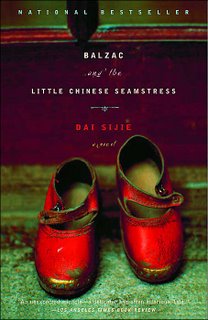 Balzac and the Little Chinese Seamstress by Dai Sijie
Balzac and the Little Chinese Seamstress by Dai Sijie
Fiction
Began on 7/21/06
Quit on 7/23/06Rating: DNF (Did Not Finish)Eh. This book didn't do a thing for me. I gave up after 70+ pages. It only has 184 pages and I felt like I'd given it more than a fair chance. Off to my discard pile.
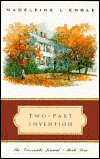 Two-Part Invention: The Story of a Marriage by Madeleine L'EngleAutobiography
Two-Part Invention: The Story of a Marriage by Madeleine L'EngleAutobiography
Began on 6/23/06
Finished on 7/20/06
Rating: A- (8/10 Very good)
To say Madeleine L’Engle is a prolific author would be quite an understatement. To date, she’s written 16 young adult novels, 4 children’s books, 8 works of general fiction, 4 autobiographical works, 7 books of reflections on scripture, 6 books of prayers, 5 collections of poetry and 11 titles of special books, plays and short stories. In one of her most recent publications (Madeleine L'Engle Herself: Reflections on a Writing Life), she states:
"I have never served a work as I would like to, but I do try, with each book, to serve to the best of my ability, and this attempt at serving is the greatest privilege and the greatest joy that I know."
And what a joy it was for me to discover one of her autobiographical works, especially since I wasn’t terribly impressed with my first (and only) encounter with her writing (Newbery Award winner, A Wrinkle in Time) four years ago.
I don’t recall when or where I found my copy of Two-Part Invention, but it seems to me it was one of my many used book store acquisitions. I was probably drawn to the subject matter as well as the attractive line-drawing of Crosswicks (Madeleine and Hugh’s New England farmhouse), but as with most of my new book purchases, it wound up on a shelf, long forgotten until last month.
I read well over 50 pages and began to wonder if it was worth sticking with any longer. Not that it wasn’t well-written, but the prelude focused on Madeleine’s life after college, working as an understudy on Broadway while struggling with her new writing career. Lots of tidbits about the actors she worked with and her social life (including that of her attraction and fondness for actor Hugh Franklin). None of this was of much interest to me, so by the end of the 70-page prelude, I’d made the decision to abandon the book. However, as I was searching Amazon for a link for my blog entry, I came across several glowing reviews, causing me to wonder if I’d been too hasty to call it quits. How fortuitous! To think I would have missed such a wonderful, wonderful book!
L’Engle weaves past and present as she recalls her shared history with her husband while facing the heartbreaking challenge of watching him slowly give in to the ravages of bladder cancer (and all the subsequent health issues he faces). L’Engle writes with tremendous honesty and the love for her husband (and her God) shines through in spite of the constant fear and worry. After 40 years of marriage, she can’t help but feel immensely vulnerable, yet she conveys a sense of incredible courage in spite of the bleak prognosis.
Favorite Passages:
When I was a child the most terrible punishment my mother could give me was to forbid me to read or write for twenty-four hours, and I would beg her to spank me instead.
A love which depends solely on romance, on the combustion of two attracting chemistries, tends to fizzle out… A long-term marriage has to move beyond chemistry to compatibility, to friendship, to companionship. It is certainly not that passion disappears, but that it is conjoined with other ways of love.
Love of music, of sunsets and sea; a liking for the same kind of people; political opinions that are not radically divergent; a similar stance as we look at the stars and think of the marvelous strangeness of this universe – these are what build a marriage. And it is never to be taken for granted.
Our love has been anything but perfect and anything but static. Inevitably there have been times when one of us has outrun the other and has had to wait patiently for the other to catch up. There have been times when we have misunderstood each other, demanded too much of each other, been insensitive to the other’s needs. I do not believe there is any marriage where this does not happen. The growth of love is not a straight line, but a series of hills and valleys. I suspect that in every good marriage there are times when love seems to be over. Sometimes these desert lines are simply the only way to the next oasis, which is far more lush and beautiful after the desert crossing than it could possibly have been without it.
But the wonderful thing, whether we are together or apart, is to know that he is in the world, and that we belong together. And what I must learn is to love with all of me, giving all of me, and yet remain whole in myself. Any other kind of love is too demanding of the other; it takes, rather than gives. To love so completely that you lose yourself in another person is not good. You are giving a weight, not the sense of lightness and light that loving someone should give. To love wholly, generously, and yet retain the core that makes you you.
It is hard to keep a sense of proportion, a sense of humor, and yet I know that laughter is most necessary when things are difficult. Life on this planet in general is not very humorous. There is nothing funny about the disaster of the Challenger, or about Chernobyl, or the cutting down of the rain forests. There is nothing funny about cancer. But despite all the horror and tragedy there is still the possibility of genuine laughter.
Right now my vulnerability is on the outside of my skin. Small things bring sobs up to my throat, but thus far only when it has been all right, appropriate, to cry. I have slowly learned a lot about grief, and the right and proper expression of it. Wearing mourning in the old days was not such a bad idea, because it took into visible account the fact of death, which we now try to hide, so that it won’t embarrass others… We pull ourselves together when we need to. We do the things that have to be done. But we need to give ourselves time and place in which to mourn. This is strength, not weakness.
But grief still has to be worked through. It is like walking through water. Sometimes there are little waves lapping about my feet. Sometimes there is an enormous breaker that knocks me down. Sometimes there is a sudden and fierce squall. But I know that many waters cannot quench love, neither can the floods drown it.
We are not good about admitting grief, we Americans. It is embarrassing. We turn away, afraid that it might happen to us. But it is part of life, and it has to be gone through.My copy is now dog-eared and highlighted, and I plan to read it many, many more times. It’s one of the most inspiring works on marriage I’ve yet to read and I’m anxious to buy the remaining three titles in her Crosswicks Journal series. Brilliant writing!
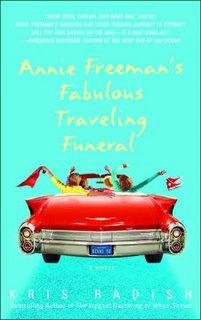 Annie Freeman's Fabulous Traveling Funeral by Kris RadishContemporary FictionFinished on 7/12/06Rating: C (3/10 Ho-hum)I had pretty low expectations for this novel, as I didn’t care much for Radish’s first book, The Elegant Gathering of White Snows. That, combined with a several negative reviews at Amazon (and my concern that reading about someone’s funeral still might be too painful), made me set it aside for several months after receiving it from my sister-in-law. Who knows why I finally picked it up when I did? I was pleasantly surprised that I fell right into the narrative in spite of the silly opening scene, but I was even more surprised that I didn’t throw the book against the living room wall before I managed to finish. The premise of the story was intriguing and captured my curiosity. I was anxious to see how the five women (many of whom didn’t know one another until they gathered at the first airport) would honor their mutual friend’s request to travel together, visiting specific locations laid out in her final request, scattering her ashes at each destination. I was also interested to see how each character would deal with the grief involved in losing a close friend.
Annie Freeman's Fabulous Traveling Funeral by Kris RadishContemporary FictionFinished on 7/12/06Rating: C (3/10 Ho-hum)I had pretty low expectations for this novel, as I didn’t care much for Radish’s first book, The Elegant Gathering of White Snows. That, combined with a several negative reviews at Amazon (and my concern that reading about someone’s funeral still might be too painful), made me set it aside for several months after receiving it from my sister-in-law. Who knows why I finally picked it up when I did? I was pleasantly surprised that I fell right into the narrative in spite of the silly opening scene, but I was even more surprised that I didn’t throw the book against the living room wall before I managed to finish. The premise of the story was intriguing and captured my curiosity. I was anxious to see how the five women (many of whom didn’t know one another until they gathered at the first airport) would honor their mutual friend’s request to travel together, visiting specific locations laid out in her final request, scattering her ashes at each destination. I was also interested to see how each character would deal with the grief involved in losing a close friend.
Annie, who died of ovarian cancer, had the entire trip planned out in advance, providing for airline tickets, hotel accommodations, meals, spending money and any other extravagant expense that the women might incur along the way. They were to travel to Sonoma, Albuquerque, the Florida Keys, New York City, the North Shore of Lake Superior, and finally (this one really caught my interest) a small island near Seattle.
While I like the idea of this non-traditional funeral and was curious to see how Annie’s closest friends would get along as a group, I was very disappointed in the author’s melodramatic and repetitious writing style. The characters were indistinguishable from one another (same complaint I had with The Elegant Gathering of White Snows) and there were far too many magical moments that felt too “over the top” for this reader. I also got very irritated with the use of Annie’s full name instead of just Annie. Why in the world would the author continue to refer to her character as Annie G. Freeman??
Suffice it to say, this isn’t a keeper and you won’t find me writing any more reviews of this author’s works. Life is too short to read such ridiculous and unpolished writing.
 French Women Don't Get Fat: The Secret of Eating For Pleasure by Mireille GuilianoNonfiction/Diet
French Women Don't Get Fat: The Secret of Eating For Pleasure by Mireille GuilianoNonfiction/Diet
Finished on 7/11/06
Rating: B+ (7/10 Good)
Growing up, I was a fairly skinny little girl. It wasn’t until I entered puberty that I even gave my weight a second thought and I must’ve been around 17 when I went on my first diet. Remember the Scarsdale Diet? Dry wheat toast and half a grapefruit for breakfast? I have no idea if I managed to lose any weight, but at the time it seemed like the thing to do. I doubt I needed to lose much more than 5 pounds, but I wanted to be tall and skinny like all the popular girls; while I couldn’t do anything about growing taller, I could try for that waifish look, even if it meant giving up some of my favorite foods (Fritos and guacamole for lunch!).
Like the majority of Americans, I tried all the new diets as they became popular. I drank liquid protein shakes in the early ‘80s, advanced to Slim Fast when it came on the market, gave the Rotation Diet a spin (not that I have any recollection of what that involved!), ate Healthy Choice microwaveable meals, and most recently got caught up in the buzz of the South Beach Diet.
Each and every one of these diets showed initial promise. I was able to see immediate results, losing a few pounds (water!) right off the bat and eagerly continued with high hopes for the perfect body. Well, at least the perfect weight.
But as with any diet, I felt deprived and could never stick with it for more than a few months – with the exception of the South Beach Diet. Rod and I both went on it together and were able to lose quite a bit of weight and keep it off for over a year. Unfortunately, last year we chose to indulge ourselves in a lot of comfort food (we were in desperate need of comfort) and all that weight came back in a matter of months.
So why in the world would I pick up French Women Don’t Get Fat? Diets don’t work. Everyone knows that. Well, it does have a cute cover and I was curious to see what the French could possibly know that Americans either are ignorant of or simply choose to ignore.
So what is Guiliano’s philosophy? Well, let’s take a look at what she says:
French women typically think about good things to eat.
American women typically worry about bad things to eat.
French women eat smaller portions of more things.
American women eat larger portions of fewer things.
French women eat more vegetables.
French women eat a lot more fruit.
French women love bread and would never consider a life without carbs.
French women don't eat "fat-free," "sugar-free," or anything artificially stripped of natural flavor. They go for the real thing in moderation.
French women love chocolate, especially the dark, slightly bitter, silky stuff with its nutty aroma.
French women eat with all five senses, allowing less to seem like more.
French women balance their food, drink, and movement on a week-by-week basis.
French women do stray, but they always come back, believing there are only detours and no dead ends.
French women don't often weigh themselves, preferring to keep track with their hands, eyes, and clothes: "zipper syndrome."
French women eat three meals a day.
French women don't snack all the time.
French women never let themselves be hungry.
French women never let themselves feel stuffed.
French women train their taste buds, and those of their young, from an early age.
French women honor mealtime rituals and never eat standing up or on the run. Or in front of the TV.
French women don't watch much TV.
French women don't have much TV to watch.
French women eat and serve what's in season, for maximum flavor and value, and know availability does not equal quality.
French women love to discover new flavors and are always experimenting with herbs, spices, and citrus juices to make a familiar dish seem new.
French women eschew extreme temperatures in what they consume, and enjoy fruits and vegetables bursting with flavor at room temperature, at which they prefer their water, too.
French women don't care for hard liquor.
French women do enjoy wine regularly, but with meals and only a glass (or maybe two).
French women get a kick from Champagne, as an aperitif or with food, and don't need a special occasion to open a bottle.
French women drink water all day long .
French women choose their own indulgences and compensations. They understand that little things count, both additions and subtractions, and that as an adult everyone is the keeper of her own equilibrium.
French women enjoy going to market.
French women plan meals in advance and think in terms of menus (a list of little dishes) even at home.
French women think dining in is as sexy as dining out.
French women love to entertain at home.
French women care enormously about the presentation of food. It matters to them how you look at it.
French women walk everywhere they can.
French women take the stairs whenever possible.
French women will dress to take out the garbage (you never know).
French women are stubborn individuals and don't follow mass movements.
French women adore fashion.
French women know one can go far with a great haircut, a bottle of Champagne, and a divine perfume.
French women know "l'amour fait maigrir" (love is slimming).
French women avoid anything that demands too much effort for too little pleasure.
French women love to sit at a cafe and do nothing but enjoy the moment.
French women love to laugh.
French women eat for pleasure.
French women don't diet.
French women don't get fat.
If asked, I would say Guiliano’s book is NOT a diet book, but rather a book about living a healthy life. It’s definitely a lifestyle, which makes all the sense in the world to me. It’s full of basic common sense and I feel that if I don’t lose the 5-10 pounds that have been hanging around for the past six years (as my cute gynecologist said, “Welcome to your 40s”), I still believe it’s a lifestyle worth adapting and one in which I will at least be able to maintain my current weight. Having said that, I have already lost 4 pounds without feeling the least bit deprived (of course it’s been 100 degrees for almost a week now and maybe that 4 pounds was merely sweated away!).
Guiliano admits to not being a "physician, physiologist, psychologist, nutritionist, or any manner of '-ist- who helps or studies people professionally." She was, however, born and raised in France (she currently resides in New York) and feels qualified to share her knowledge about French women and their healthy lifestyles.
Other obvious guidelines:
Savor every bite. Put utensils down every few bites. Portion control - use a scale until you learn to eye 4-6 oz. Don't buy junk (chips, ice cream, cookies, beer) if you lack self-control. If it's not around, you can't eat it. Save those treats for a social event or weekend, but don't keep in stock.
Walk at least 20-30 minutes a day.
Always have something on hand to eat if you start to feel hungry (string cheese, apple, almonds) while away from home.
Deprivation is the mother of failure. Reward yourself with a little something on the weekend, but don't go overboard. Enjoy dessert but skip the chips; savor the baked potato and butter, but skip the beer or margarita.
Nuts are a nutritious snack, but they're high in calories and fat, so be careful. Don't overindulge!
Meat once a week; fish 1-2 times a week
If you eat a large lunch, make dinner a more modest meal. Likewise, if dinner is to be large, go lighter with lunch.
Some favorite quotes:
"Making choices that are meaningful to you is the essence of the French woman's secret."
"The key is to cultivate your own intuition of your offenders and pleasures and adjust each accordingly by degrees that suit you."
"When you add an indulgence, make a corresponding reduction to compensate. Add another half hour of walking the next day. Skip the cocktail. Pass the breadbasket."
"The trick is to manage and gratify your appetites, while determining how, when, and what to reduce. Eat breakfast!! Don't skip meals or rely on ‘protein’ shakes for meal substitutions. Eat with your head. Make wise choices. Don't try to achieve an ideal weight (based on insurance company charts that focus only on height and gender) or fashion weight, but rather a ‘well-being’ weight, the one at which a particular individual feels biendans sa peau (comfortable in his or her skin)... It's the weight at which you can say, 'I feel good and I look good.'"
Obviously, I found a lot of useful information in this book and I would definitely recommend it to anyone who not only wants to try to lose a little (or a lot of) weight, but also to anyone who wants to try to live a more healthy life. I read a library copy and am tempted to buy a copy for my permanent collection. Guiliano includes several recipes in her book and I’d like to give some a try. And I just discovered she has a new book coming out in October called French Women for All Seasons: A Year of Secrets, Recipes, and Pleasure. Definitely something I want to check out (and not just because it has a cute cover!).
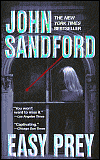 Easy Prey by John Sandford
Easy Prey by John Sandford
Mystery
Finished on 6/22/06
Rating: B+ (7/10 Good)Poor Lucas. When it rains, it pours. Not only has Weather (the beautiful, intelligent doctor whom Lucas was engaged to up until she called it all off after getting caught in the crossfire of one of Lucas’ gunfights) begun to show an interest in rekindling their relationship, but an old flame from college (whom he never really quite got over) has been in touch with Lucas, also expressing an interest in rekindling their relationship (as her own marriage falls apart). If that isn’t enough to confuse the poor guy (who is a few years older, wiser and less of a womanizer than in previous books), a gorgeous, young (albeit bisexual) model is demonstrating quite a bit of interest in a casual (yet physical) relationship with Davenport.
Meanwhile, back at the police station, our favorite detective is busy trying to solve not one, not two, but a string of related murders which all started one night at a wild party thrown by a wealthy socialite with a guest list composed mainly of actors, artists and models. There are over a hundred possible suspects, including one of Lucas’ undercover agents who just happens to be in the wrong place at the wrong time.
Suffice it to say, Lucas has his hands full.
Easy Prey isn’t any more complicated than other mysteries in Sandford’s “Prey” series, yet something was definitely missing and the book never grabbed my attention. Several of the supporting characters failed to come to life and the plot lacked the necessary tension to keep the pages turning. Maybe I’ve come to enjoy being privy to the identity of the murderer and the absence of that knowledge left me on the sidelines, watching Lucas attempt to unravel the connection among the various murders, feeling just as clueless as he. In spite of the novel’s shortcomings and anticlimactic finale, I still enjoyed the subplot between Lucas and Weather (hence the decent rating) and look forward to the next book in the series (Chosen Prey).

Certain Prey by John SandfordMysteryFinished on 6/19/06Rating: A (9/10 Terrific!)This has to be one of the more immediately engrossing of Sandford’s mysteries I’ve read so far. It usually takes a while to settle into the assorted characters and complicated plotlines before I’m hooked, but not so with Certain Prey. I was sucked in from the get-go and thoroughly enjoyed the ride. As always, it was fun to sit back and watch Lucas chase red herring after red herring, enjoying the privilege of being in on the perpetrator’s identity long before Lucas manages to figure it out. Definitely one of my favorites in the series.
 A Walk on the Beach: Tales of Wisdom From an Unconventional Woman by Joan AndersonNonfictionFinished on 6/16/06Rating: C (3/10 Ho-hum)
A Walk on the Beach: Tales of Wisdom From an Unconventional Woman by Joan AndersonNonfictionFinished on 6/16/06Rating: C (3/10 Ho-hum)
Joan Anderson has published three books centered around the year (and subsequent years with her husband) she spent living alone in her family cottage on Cape Cod, choosing not to join her husband when he accepts a new job and is forced to sell their home and relocate. As I wrote in my reading journal in 2002, after finishing A Year By the Sea, the idea of escaping to a cottage on Cape Cod to find yourself sounds wonderful, but perhaps for only a month or so, not an entire year! I happen to be very happily married to my best friend and have already spent far too much time living apart (thanks to those lovely job transfers and relocations) and can't imagine wanting to voluntarily spend a year apart ever again!
I enjoyed parts of the first installment of the trilogy (gave it a B, or a 6/10 rating), but thought the introspective details a bit tedious. Anderson's second book, An Unfinished Marriage, focuses on the time spent with her husband after he chooses to retire and join her at their Cape Cod cottage. It was a quick and thought-provoking read, which I enjoyed quite a bit (an A, or 5/5 rating), perhaps due to Anderson's more approachable narrative. She doesn't come across as quite so selfish and self-centered as she did in A Year By the Sea.
Unfortunately, I wasn't nearly as impressed with A Walk On the Beach. I had hoped to garner some words of wisdom from Anderson's elderly neighbor and mentor, Joan Erikson (wife of Erich Erikson, the renowned psychoanalyst). With a subtitle of "Tales of Wisdom from an Unconventional Woman" that's what I was led to believe. Yet, Anderson repeats the same stories and conversations she shared in her previous books, obviously expanding and providing further details to her anecdotes; yet to anyone who has read the earlier works, this sequel comes across as a regurgitation of ideas previously explored and a poor excuse for another royalty check.
I’m sure Joan Erickson was a wonderful woman and someone I’d enjoying walking the beaches of Cape Cod with – there is something about her, as told by Anderson, that reminded me of my grandmother – but, unfortunately, Anderson’s recollections of conversations between herself and her mentor come off as just a bit too contrived and, at times, even sappy. While some may find a gem or two in Erikson's oversimplified platitudes on living a rich and fulfilling life, the book was a waste of my time and money. I even had a sense of deja vu, wondering if I’d already it. This small book is quick to read and might do well as a stand-alone, but given a choice, I'd recommend Mitch Albom's Tuesday's With Morrie instead.
Note: After a quick visit to Amazon to capture the hyperlink for this book, I noticed that Anderson has written another book entitled A Weekend to Change Your Life : Find Your Authentic Self After a Lifetime of Being All Things to All People. Puleeeeeeze! No more!! This is one I can live without, thank you very much.















